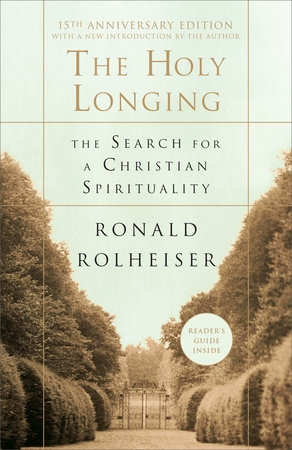Excerpt
The Holy Longing
The SituationTell a wise person, or else keep silent,
Because the massman will mock it right away.
I praise what is truly alive,
what longs to be burned to death.
In the calm water of the love-nights,
where you were begotten, where you have begotten,
a strange feeling comes over you
when you see the silent candle burning.
Now you are no longer caught
in the obsession with darkness,
and a desire for higher love-making
sweeps you upward.
Distance does not make you falter,
now, arriving in magic, flying,
and finally, insane for the light,
you are the butterfly and you are gone.
And so long as you haven't experienced
this: to die and so to grow,
you are only a troubled guest
on the dark earth.--JOHANN WOLFGANG VON GOETHE, "The Holy Longing"1
1
What Is Spirituality?
"We are fired into life with a madness that comes from the gods and which would have us believe that we can have a great love, perpetuate our own seed, and contemplate the divine."2
Desire, Our Fundamental Dis-Ease
It is no easy task to walk this earth and find peace. Inside of us, it would seem, something is at odds with the very rhythm of things and we are forever restless, dissatisfied, frustrated, and aching. We are so overcharged with desire that it is hard to come to simple rest. Desire is always stronger than satisfaction.
Put more simply, there is within us a fundamental dis-ease, an unquenchable fire that renders us incapable, in this life, of ever coming to full peace. This desire lies at the center of our lives, in the marrow of our bones, and in the deep recesses of the soul. We are not easeful human beings who occasionally get restless, serene persons who once in a while are obsessed by desire. The reverse is true. We are driven persons, forever obsessed, congenitally dis-eased, living lives, as Thoreau once suggested, of quiet desperation, only occasionally experiencing peace. Desire is the straw that stirs the drink.
At the heart of all great literature, poetry, art, philosophy, psychology, and religion lies the naming and analyzing of this desire. Thus, the diary of Anne Frank haunts us, as do the journals of Thérèse of Lisieux and Etty Hillesum. Desire intrigues us, stirs the soul. We love stories about desire--tales of love, sex, wanderlust, haunting nostalgia, boundless ambition, and tragic loss. Many of the great secular thinkers of our time have made this fire, this force that so haunts us, the centerpiece of their thinking.
Sigmund Freud, for example, talks about a fire without a focus that burns at the center of our lives and pushes us out in a relentless and unquenchable pursuit of pleasure. For Freud, everyone is hopelessly overcharged for life. Karl Jung talks about deep, unalterable, archetypal energies which structure our very souls and imperialistically demand our every attention. Energy, Jung warns, is not friendly. Every time we are too restless to sleep at night we understand something of what he is saying. Doris Lessing speaks of a certain voltage within us, a thousand volts of energy for love, sex, hatred, art, politics. James Hillman speaks of a blue fire within us and of being so haunted and obsessed by daimons from beyond that neither nature nor nurture, but daimons, restless demanding spirits from beyond, are really the determinative factors in our behavior. Both women's and men's groups are constantly speaking of a certain wild energy that we need to access and understand more fully. Thus, women's groups talk about the importance of running with wolves and men's groups speak of wild men's journeys and of having fire in the belly. New Age gurus chart the movement of the planets and ask us to get ourselves under the correct planets or we will have no peace.
Whatever the expression, everyone is ultimately talking about the same thing--an unquenchable fire, a restlessness, a longing, a disquiet, a hunger, a loneliness, a gnawing nostalgia, a wildness that cannot be tamed, a congenital all-embracing ache that lies at the center of human experience and is the ultimate force that drives everything else. This dis-ease is universal. Desire gives no exemptions.
It does however admit of different moods and faces. Sometimes it hits us as pain--dissatisfaction, frustration, and aching. At other times its grip is not felt as painful at all, but as a deep energy, as something beautiful, as an inexorable pull, more important than anything else inside us, toward love, beauty, creativity, and a future beyond our limited present. Desire can show itself as aching pain or delicious hope.
Spirituality is, ultimately, about what we do with that desire. What we do with our longings, both in terms of handling the pain and the hope they bring us, that is our spirituality. Thus, when Plato says that we are on fire because our souls come from beyond and that beyond is, through the longing and hope that its fire creates in us, trying to draw us back toward itself, he is laying out the broad outlines for a spirituality. Likewise for Augustine, when he says: "You have made us for yourself, Lord, and our hearts are restless until they rest in you."3 Spirituality is about what we do with our unrest. All of this, however, needs further explanation.




